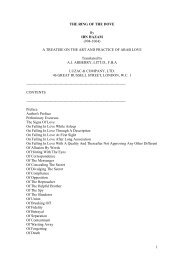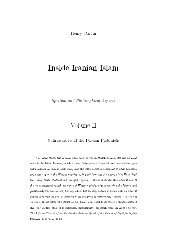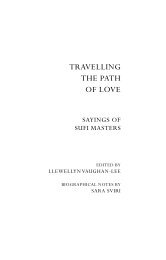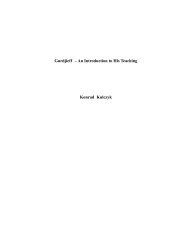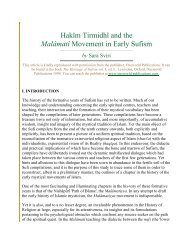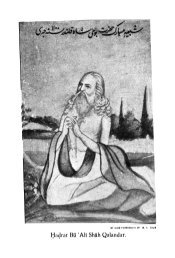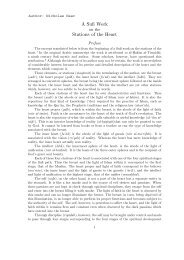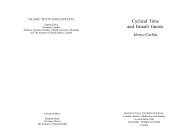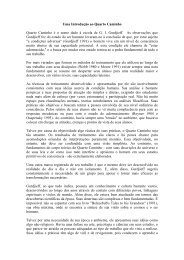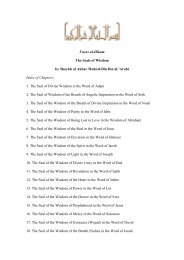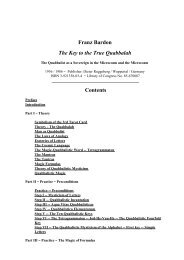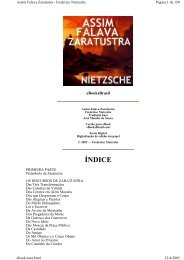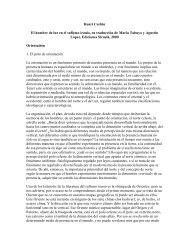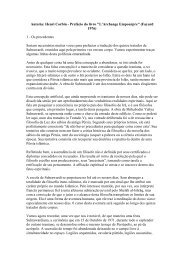Temple and Contemplation brings together for the first ... - ImagoMundi
Temple and Contemplation brings together for the first ... - ImagoMundi
Temple and Contemplation brings together for the first ... - ImagoMundi
Create successful ePaper yourself
Turn your PDF publications into a flip-book with our unique Google optimized e-Paper software.
SABIAN TEMPLE AND ISMAILISM<br />
<strong>the</strong> surest means whereby to aggravate <strong>the</strong>ir earthly Hell, <strong>for</strong> <strong>the</strong>n <strong>the</strong><br />
image of Paradise is bound to be a provocation, stimulating <strong>the</strong>ir fury of<br />
perversion <strong>and</strong> mockery. If, that is, <strong>the</strong>y do not find it boring in <strong>the</strong><br />
extreme, <strong>for</strong> this image is indeed <strong>the</strong> image of a Paradise lost. The history of<br />
Ismailism may be no more than one long paradox: it was harder <strong>for</strong> it to<br />
survive its triumphs than to recover from its setbacks. More than once,<br />
Ismaili writers have captured <strong>the</strong> image of <strong>the</strong>ir great <strong>and</strong> noble dream in<br />
striking terms. They were perfectly aware of its opposition to <strong>the</strong> law<br />
which is <strong>the</strong> curse of this world, <strong>the</strong> urge to dominate, <strong>the</strong> ambition <strong>and</strong><br />
vanity of power which makes <strong>the</strong> soul <strong>the</strong> veritable habitation of Hell <strong>and</strong><br />
which are truly <strong>the</strong> "punishment of <strong>the</strong> black stone by <strong>the</strong> black stone".<br />
The famous eleventh-century Iranian Ismaili, Nasir-i Khusraw, in his<br />
Persian translation of a Koranic verse (82:19) to which he gives an<br />
unexpected <strong>for</strong>ce, prefigures in this way <strong>the</strong> future Reign of <strong>the</strong> Spirit:<br />
"There will come a day when no soul will have comm<strong>and</strong> over any o<strong>the</strong>r<br />
soul, <strong>and</strong> on that day, yes, <strong>the</strong> Order will belong to God." 160<br />
Tehran, June 25, 1950<br />
160 Cf. Khwan al-Ikhwan (The Table of <strong>the</strong> Bro<strong>the</strong>rs), ed. Yahya al-Khashshab (Cairo,<br />
1940), p. 245; cf. also Jami' al-Hikmatayn, § 117 of my edition (note 7). Nasir-i<br />
Khusraw's entire book, entitled Kitab Wajh-i Din, ed. Kaviani (Berlin, 1925), is a<br />
long exercise in ta'wil, leading from <strong>the</strong> external appearances to <strong>the</strong> true <strong>and</strong> secret<br />
face of <strong>the</strong> ritual prescriptions <strong>and</strong> religious traditions.<br />
182



